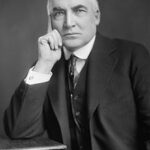The Historic Washington Naval Conference
President Warren G. Harding convened the Washington Naval Conference in November 1921. This groundbreaking diplomatic gathering brought together nine world powers. The conference addressed rising naval tensions following World War I.
Revolutionary Arms Limitation Proposals
Secretary of State Charles Evans Hughes stunned delegates with bold proposals. He called for scrapping nearly two million tons of warships. The plan targeted existing battleships and those under construction. Hughes’s approach was direct and unprecedented in diplomatic history. 📊 The proposal included specific ship ratios among major naval powers.
Successful Treaty Negotiations
The conference produced the Five-Power Naval Treaty in February 1922. Britain, America, Japan, France, and Italy agreed to binding limits. The treaty established a 5:5:3 ratio for American, British, and Japanese battleships. ⚠️ This prevented a costly arms race that could have bankrupted nations. The agreement also included a ten-year moratorium on new battleship construction. 💰 Estimated savings reached billions of dollars across participating nations.
Impact:
Immediate International Stabilization
The Washington Naval Conference transformed post-war international relations immediately. Naval competition between major powers decreased significantly after treaty ratification. 🌍 The agreements reduced tensions in the Pacific region substantially. Japan accepted naval limitations in exchange for territorial concessions. The conference established America as a credible peace broker internationally.
Long-term Economic and Strategic Benefits
Participating nations avoided devastating financial burdens from naval expansion. 📉 Military spending declined as countries honored their treaty commitments. The agreements lasted throughout the 1920s and early 1930s. American taxpayers saved millions in potential warship construction costs. The treaties demonstrated that international cooperation could prevent arms races.
Historical Significance and Legacy
Historians consistently rank the Washington Naval Conference among Harding’s greatest achievements. The conference established precedents for future arms control negotiations. 🔥 It prevented potential conflicts that could have erupted from naval competition. The success enhanced America’s reputation as a responsible world power. Later arms control agreements drew inspiration from Harding’s diplomatic approach. The conference proved that multilateral diplomacy could achieve concrete results.
